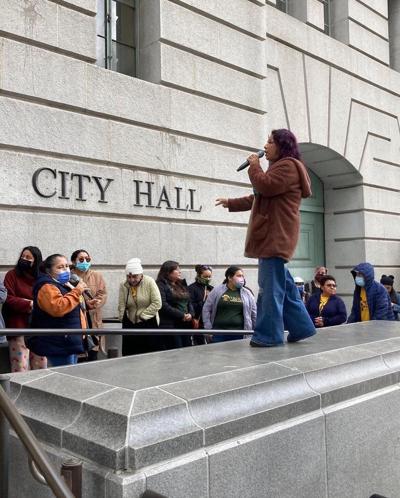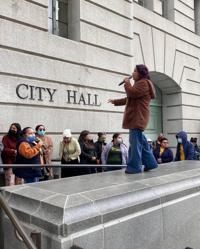
LA tenants pushing for the ordinances outside of city hall. Photo courtesy of Stephano Medina
Last month, a Los Angeles Superior Court judge legally upheld two tenant protection ordinances passed by city council, which look to protect tenants and make sure no additional residents become homeless.
One ordinance prohibits evictions based on nonpayment unless the tenant owes at least one month’s fair market rent, and the other ordinance requires landlords to provide relocation assistance to tenants forced to leave due to significant rent increases.
Los Angeles City Council initially adopted the new tenant protections last year, in February 2023, but the Apartment Association of Greater Los Angeles (AAGLA) filed a lawsuit seeking to overturn the ordinances a month later.
AGGLA’s lawsuit argued that the ordinance conflicted with state law, which says that a landlord may serve a three-day notice to pay rent or leave “at any time within one year after the rent becomes due,” regardless of the amount of money that is due. “This action challenges the city’s adoption of two ordinances... that are preempted by state laws governing the landlord-tenant relationship and are thus invalid,” stated the complaint.
Los Angeles Judge Mitchell Beckloff denied AAGLA’s legal challenge seeking to overturn the two ordinances, finding that each was well within the limits set by state law.
Renter-rights organizations and tenant advocates, including Public Counsel, the Legal Aid Foundation of Los Angeles (LAFLA), Inner City Struggle (ICS) and Community Power Collective (CPC), intervened in the case to defend the ordinances. They said being part of defending the ordinances was necessary as a way to represent thousands of low-income tenants in Los Angeles.
The adoption of the ordinances comes at a time when many tenants face unprecedented challenges. This February marked the end of the COVID-19 renter protections in the City of Los Angeles, which protected tenants who were unable to pay rent due to the economic fallout from the COVID-19 pandemic. February 1 marks the deadline for LA renters and tenants to pay back all past rent owed from March 1, 2020, to September 30, 2021. Moving forward, tenants must also pay full monthly rent to avoid eviction, beginning February 1.
Stephano Medina, Staff Attorney at Public Counsel, which helped uphold the legality of the ordinances, said that prohibiting evictions based on nonpayment unless the tenant owes at least one month's rent is a way that will hopefully keep more Angelinos housed, especially those who risk eviction because they fall short on rent. “I used to work as an eviction defense attorney and I would see tenants get evicted in eviction court for being under $10 behind on their rent and I would see that frequently,” he told CALÒ News. “The nonpayment threshold ordinances basically say that in order to get evicted for nonpayment in Los Angeles, you have to owe at least 1 month's fair market rent, which depends on the size of the unit that you're living in, how many bedrooms you have and overall how much apartments go for in that specific area.”
When it comes to the relocation assistance ordinance, Medina said it will help tenants who get an immediate eviction notice to relocate faster and more efficiently. “What that law does is say that if you're going to get evicted in Los Angeles, your landlord has to give you first and last month's rent, as well as a security deposit at whatever the prevailing current market rate is for the size of your bedroom in your area," he said.
Public Counsel, Legal Aid Foundation of Los Angeles (LAFLA), InnerCity Struggle (ICS) and Community Power Collective (CPC), the defenders of these ordinances, were what the court refers to as "interveners." After AAGLA filed a lawsuit against the city in March, seeking to overturn the ordinances, LAFLA, CPC and ICS worked to get into the lawsuit.
“Once the judge allowed us to join the case as interveners in May, the following months, from June through November, we were just writing briefs and sending notes to the judge, trying to defend the ordinances,” he said. In November 2023, both the interveners and AAGLA appeared before the judge before the final ruling was released in late January.
Eva Garcia, a tenant organizer with Community Power Collective (CPC) said that although they are happy about the court’s decision to uphold the ordinances, the work to protect tenants continues. “We are thrilled, and at the same time, we are not done. Tenants still have to go to court to enact this protection, meaning a codified right to counsel is imperative,” she said. “We also know that the pandemic has left many families with more than one month of rental debt, and we need to find a way to ensure they don’t end up on the streets.”
According to the LA City Controller’s office, more than 77,000 evictions were filed in Los Angeles between February and December 2023. At the same time, homelessness has grown nearly 10% across LA City and County last year.
For Medina and Public Counsel, defending tenants' rights and adopting stronger rent controls and eviction protections helps alleviate the growing number of residents in L.A. who have housing one day and suddenly become homeless overnight, but according to AGGLA, which has approximately 10,000 members who own and manage over 300,000 rental units, these ordinances put a financial threshold, causing many homeowners, especially first-time homeowners, to lose their homes. “We just came through 4 years of COVID-19-related regulation. The City of LA would not allow apartment owners to increase rent for four years. There are moratoriums on evictions, and a lot of our members were taken advantage of because of that. They didn't collect rent,” Daniel M. Yukelson, executive director of AAGLA, told CALO News.
Yukelson believes many of his clients are being taken advantage of by some renters. He said some renters in L.A. are “trying to game the system" because they know they can’t be evicted unless they owe more than one month's rent. “What we've seen from renters is that they are withholding $100 or $200 per rent a month, and the owner can't take action until that threshold has been exceeded,” he said.
Yukelson said there's no accounting for whether some renters are low- or moderate-income, and for him, that's one of the biggest flaws with these ordinances. According to Yukelson, these ordinances provide protection to the city’s wealthiest renters, often those who make far more income than the individuals providing them with housing. “Everybody gets a free-for-all ride on the back of some small property owners,” he said. ”When it comes to the relocation ordinances, if, for example, renters in a 25,000 to 35,000 Bel Air mansion get notified of a lawful rent increase and they say they can’t afford it and if they have to move out because of that, then the owner has to pay ten thousand dollars to relocate. It's basically a windfall for the renters.”
AAGLA represents homeowners in San Bernardino, Ventura and LA County, but the bulk of their members are concentrated in LA. Medina said AAGLA has filed many lawsuits against tenant-protection laws. “I don't think their real strategy is to make a difference in court but instead, they do everything they can to postpone the enforcement of policies that were passed by voters and their elected representatives,” he said.
According to Medina, the judge's decision to protect the ordinances sends a clear message to cities throughout the state on the importance of local leaders to innovate, like Los Angeles advocates have done, to help families stay in their homes and prevent frivolous evictions. He hopes other states and counties feel inspired to adopt similar ordinances in favor of tenants. “There are still gaps in providing information about protections to tenants. LAFLA, ICS and Community Power Collective are already educating the tenants they work with on a daily basis, but we want all tenants to know they have rights and that they are protected, especially in these vulnerable times.”











(0) comments
Welcome to the discussion.
Log In
Keep it Clean. Please avoid obscene, vulgar, lewd, racist or sexually-oriented language.
PLEASE TURN OFF YOUR CAPS LOCK.
Don't Threaten. Threats of harming another person will not be tolerated.
Be Truthful. Don't knowingly lie about anyone or anything.
Be Nice. No racism, sexism or any sort of -ism that is degrading to another person.
Be Proactive. Use the 'Report' link on each comment to let us know of abusive posts.
Share with Us. We'd love to hear eyewitness accounts, the history behind an article.